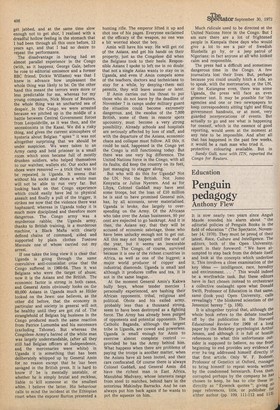Penguin pedagogy
Anthony Flew
It is now nearly two years since Angug Maude sounded, his alarm about "the editorial policies of Penguin Books in the field of education" (The Spectator, November 14, 1970). They must be proud, of their latest, Race, Culture and Intelligence. The editors, both of the Open University, assert in their foreword: "We have attempted to step back from the debate itself and look at the concepts which underline it. This involves a close examination of the key ideas — intelligence, race, heredity and environment. . . ." This would indeed be a worthwhile task. But these editors have in fact chosen instead to orchestrate a collective onslaught upon what Donald Swift, Professor of Education in that same, same (look you) Open University, calls revealingly "the blinkered scientism of the Jensenist heresy" (p. 156).
It is altogether typical that, although the whole book refers to the debate touched off by the publication in the Harvard Educational Review for 1969 of a long paper by the Berkeley psychologist Arthur Jensen, and although it is full of hostile references to what this unfortunate outsider is supposed to believe, no one frorn beginning to end provides any evidence of ever ha ling addressed himself directly to that first article. Only W. F. Bodmer, Professor of Genetics at Oxford, manages to bring himself to repeat words written by the condemned heresiarch. Even then, corrupted perhaps by the company he has chosen to keep, he has to cite these indirectly as " Eysenck quotes "; giving n° page references, title, or publisher for either author (pp. 109, 111-112 and 113)'
No doubt to have permitted proper representation to the views of the dissenting outsider would have been — it is now, significantly, a favourite word of our left wing establishment — divisive. As the editors explain, "we hope to offer a clear perspective for the whole problem and a starting point from which we may proceed less divisively."
You can from this tell all too well the sort of book it is, and I trust that that makes you want not to read it. Yet things cannot safely be left there, on the shelf or in the waste-paper basket. For if you read this, and other specimens of Penguin Education, you should want to raise Urgent and appalled questions about the sort of teaching which these professional educators are providing; and still more about the kind of students whom they attract, or perhaps produce. Are the students in their charge all indoctrinated sheep, incapable of critical questioning? Surely no one who was regularly confronted with, and who was encouraging, lively, mischievous, questioning students could Possibly get away with some of these things.
Consider, for instance, one assertion made by John Daniels, Head of the Further Professional Training Division in the School of Education at Nottingham, and by Vincent Houghton, Head of the Division of Behavioural Sciences at Huddersfield Polytechnic.
Daniels and Houghton say, of a "system of graded meritocratic assignment of social roles," that: " It is hard to see how the grading system can be retained when a guarantee of job opportunity can no longer be given" (P. 78). Oh yes; and who, please is proposing to give command of a ship in the merchant navy to an unqualified man, just because there are in fact more men who have earned their Master's Certificates than there are Captains' jobs?
The same pair proudly present, as a knock-down decisive argument against the importance of heredity, this: "if 80 per cent of adult performance is directly dependent upon genetic inheritance, how have the styles of our lives and the patterns of our thinking changed to the extent that they have? . . . there is no answer to this question" (p. 74). There is, you know. But to see and appreciate that answer you again need to be master, as this precious pair so evidently are not, of the elementary distinction between a necessary and a sufficient condition. Obviously they have not got what it takes. But then, have they no bright student to put them right? Or is it that no one under thier care is prepared to challenge a bad argument when it is employed to support a conclusion which is part of the approved doctrine of the Radical educationalists? Try another (ugh!). John Rex, Professor of Sociology at Warwick, writes without irony: "On the whole, the quality media have not been entirely useful in promoting racism" (p. 174). Understandably, albeit scandalously, no evidence is vouchsafed to support these suggestions: that someone has been trying to get the quality media to promote racism; and that he has, or they have, been partly if not entirely successful. Warming to his bad work Rex claims: "One significant phenomenon . . is the body of ideas associated with the words ecology, conservation, pollution, etc. In this latter case human political judgement is no longer considered, even as an intervening variable. The ills of the world are simply explained as being due to inexorable scientific laws" (p. 176).
You will, surely, have to read that one again before you can believe your eyes. For, of course, what all the fuss about ecology, conservation, and pollution actually is about, precisely is what generally is not, but could be, and should be, done. I suggest that Rex is victim here of motivated psychic blindness. What is so awkward for him about the evils which concern conservationists is that these are evils which even he would find difficulty in attributing exclusively to capitalism, and in proposing to cure by the total nationalisation of everything; in fact, for instance, the arch-socialists of the Russian Empire unite with the arch-capitalists of Japan to destroy the remaining species of whales. But, be that as it may, what Rex here offers as an item of relevant and revealed sociological truth is in fact manifestly and diametrically false. Once again we must press the frightening question: 'Do such practitioners of what one hesitates to call, in this case, the discipline of sociology never have to face critical and persistent oral questioning; and, if so, why not?' For that is part of what education, if not 'Penguin Education,' is about.











































 Previous page
Previous page